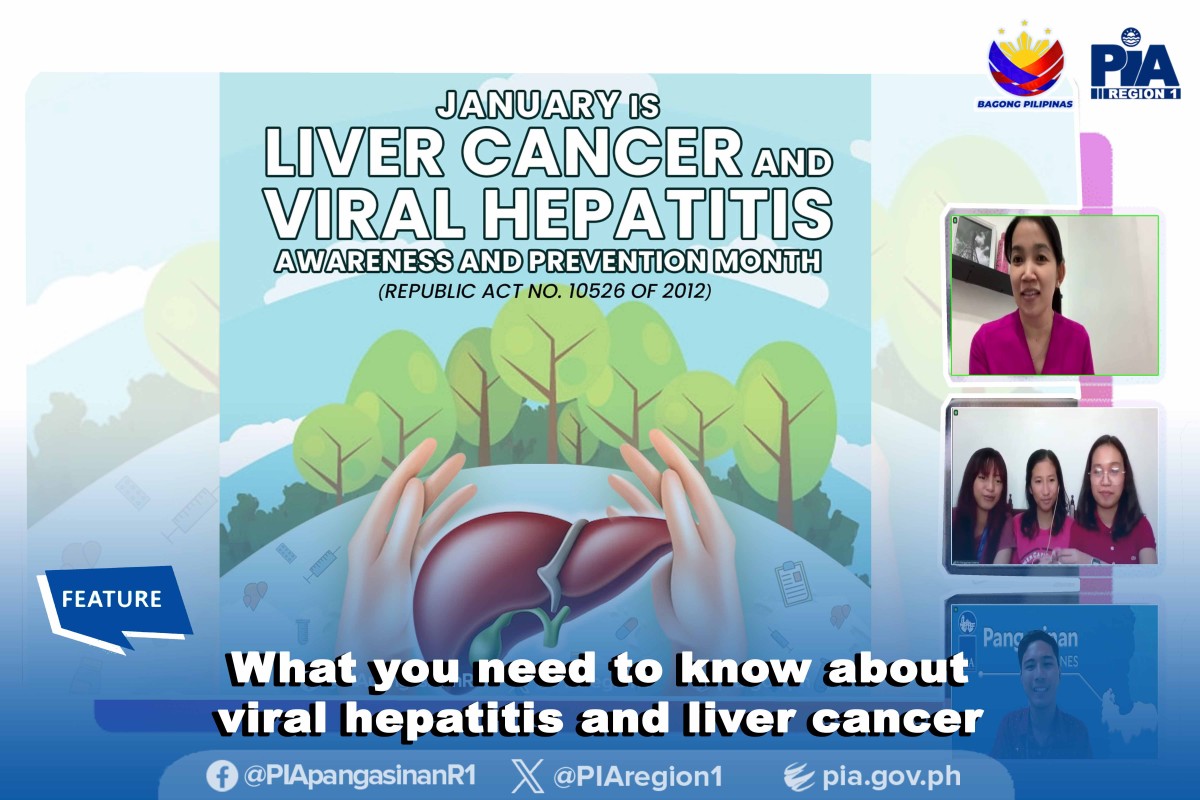The liver is a vital gland that processes nutrients, filters blood, and fights infections.
When attacked by certain bacteria or viruses, it becomes inflamed and the condition is popularly known as “hepatitis.”
Dr. Sophia Zamora, medical officer at the Internal Medicine Department of the Region 1 Medical Center (R1MC) in Dagupan City said “Hepatitis B, which can be transmitted through body fluids, and Hepatitis C, which is usually acquired through exposure to contaminated blood, are common causes of liver damage and ultimately liver cancer.”
She explained that liver cancer or hepatocellular carcinoma usually comes from hepatitis B and C, but it can also be hereditary if he has a first-degree relative with a liver tumor.
She affirmed that unhealthy lifestyles such as over dosage of medicines, prolonged exposure to alcohol, and consuming fatty food increase the risk of developing liver cancer.
People of any age can acquire viral hepatitis which can lead to liver cancer.
Thus, Zamora advised all babies should receive the HepB vaccine three times – at zero, one, and six months of age.
“Itong vaccination, ito ang nagpi-prevent sa atin na mahawaan ng hepatitis B na pwedeng maging dahilan kung bakit pwedeng magkaroon ng liver cancer. Pwedeng maka-avail sa R1MC o kaya naman sa mga Rural Health Unit (RHU) dito sa Pangasinan,” said Zamora.
(Vaccination prevents us from getting infected with hepatitis B, which can be the reason why we can get liver cancer. It can be availed at R1MC or Rural Health Units (RHU) in Pangasinan.)
Others may undergo screening if they want to check if they have hepatitis – especially if they show flu-like symptoms such as fever and muscle aches or extreme symptoms such as jaundice (yellowing of the skin), abdominal distension (enlargement of the stomach), and ascites (presence of fluid in abdominal spaces) – that can lead to liver cancer.
On the other hand, Zamora said there are no vaccines for liver cancer, and the only treatment is either surgery or chemotherapy.
She cautioned people about consuming herbal medicines floating on social media, as these have not undergone medical trials or been approved by the Food and Drug Administration (FDA).
Many people can be cured of hepatitis C with proper treatment and live healthy lives, however, Zamora said there is no cure for hepatitis B, hence, she shared tips to avoid this significant health issue:
• To prevent the spread of hepatitis B, get vaccinated and screen your partner before having sex.
• If the mother has hepatitis B, inform the hospital so the baby can get vaccinated.
• Do not share personal items that may be contaminated with blood or other fluids.
Likewise, Zamora said that people with hepatitis should not feel ashamed or despair about their health status and urged everyone to be open and honest with their healthcare providers to receive proper monitoring and treatment.
For more information about liver cancer and viral hepatitis, Zamora stated to visit the Facebook page of Yellow Warriors Society Philippines at https://www.facebook.com/YellowWarriors or the official website of Hepatology Society of the Philippines at https://hsp.org.ph/.
Moreover, she advised the public that the Internal Medicine’s Outpatient Department (OPD) of R1MC is available for consultation from Monday to Saturday, and a gastroenterologist specialist on Wednesdays from 2:00 p.m. to 4:00 p.m.
Republic Act 10526 designates the month of January as the Liver Cancer and Viral Hepatitis Awareness and Prevention Month in the Philippines.
As part of the celebration, Zamora conducted a lecture regarding Hepatitis B and prevention for liver cancer on Tuesday at the Pangasinan Health Office and the R1MC’s OPD is presenting a video that started this third week of January to enhance public knowledge and awareness about these diseases and also emphasized that the efforts towards prevention and awareness should be continuous and not limited to a month. (JCR/MJTAB/JCDR/DMLT/PIA Pangasinan)



